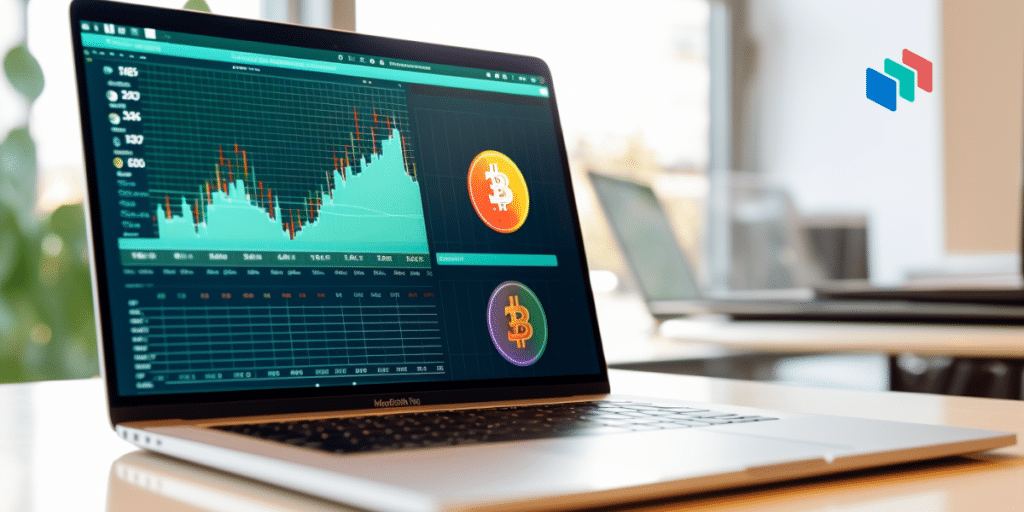Imagine this, your nation bans crypto investing tomorrow. How can you legally gain exposure to the market now?
Well, you can do it through publicly listed companies that operate in the crypto industry. These companies serve as proxies due to their financial health being directly linked to crypto markets.
We have listed five such stocks that can help you gain indirect exposure to bitcoin (BTC), ether (ETH), and more. You can even invest in these companies to sidestep tax issues and poor user experiences that many encounter when investing in crypto.
Do note that this article is not meant to be financial advice. Always do your own research before investing.
5 Stocks for Indirect Crypto Exposure
Coinbase (COIN): Not Just a Crypto Exchange
Coinbase is arguably the best proxy for cryptocurrency markets. As a global crypto exchange, Coinbase earns a fee every time a customer buys, sells, or swaps crypto tokens on its platform.
Historical data has shown that Coinbase thrives during crypto bull runs. Market enthusiasm is always high when asset prices are on the rise. Fear of missing out (FOMO) brings in thousands of new traders to the market during such times. We saw this play out in the crypto bull run of 2021 when retail trading exploded amid bitcoin’s rise to an all-time high of over $68,000.
In 2021, Coinbase reported full-year net revenue of about $7.84 billion, out of which the company pocketed $3.62 billion as net profit (46% profit margin). That same year, the company’s share price hit an all-time high of $429.
However, as the crypto winter took over in 2022 and the excitement among the public faded, Coinbase’s full-year revenue fell nearly 50% year-on-year to about $3.15 billion. The drop in crypto trading volume in 2022 saw Coinbase post an annual net loss of $2.62 billion.
Although Coinbase earns a major chunk of its revenue from trading, it would be a mistake to look at Coinbase as “just a crypto exchange.” The company is constantly innovating and diversifying away from its trading business.
Coinbase provides staking-as-a-service to retail and institutional clients. The company offers custodial services such as cold storage solutions to clients. Coinbase also earns interest income from crypto loans and interest on customer custodial funds. In 2023, Coinbase acquired an undisclosed equity stake in stablecoin USD Coin (USDC) issuer Circle.
The company launched an Ethereum layer-two rollup called Base in 2023 which is expected to spearhead its decentralized finance (DeFi) charge. Meanwhile, The Coinbase Wallet remains a popular non-custodial wallet that allows users to experience DeFi and other Web3 applications.
MicroStrategy (MSTR): Bitcoin Whale
MicroStrategy is an enterprise software company that is known for its bitcoin acquisition strategy.
Over the last decade, the company has used free cash flows from its software business to acquire and hold BTC for the long term. As of July 2023, MicroStrategy held 152,800 BTC acquired at a total cost of $4.53 billion, making the company one of the biggest bitcoin whales in the world.
MicroStrategy’s bitcoin acquisition strategy involves the company using leftover funds to buy BTC. The company has also not shied away from using debt and capital raise transactions to buy BTC if it deems market conditions to be favorable.
Michael Saylor, Microstrategy’s co-founder and chairman, is a popular figure in the crypto community who has consistently advocated BTC’s store of value properties. The company sees BTC as a hedge against sovereign monetary policy and inflation due to its public open-source nature and limited supply.
The Nasdaq-listed company is currently exploring opportunities to apply bitcoin and lightning network-related technologies to its software offerings.
Microstrategy posted full-year revenue of $86.5 million in 2022, down from $101.8 million in 2021. The company reported a full-year loss of about $1.28 billion in 2022. Digital asset impairment losses came in at $1.28 billion for the year.
Marathon Digital Holdings (MARA): Largest Bitcoin Miner
Marathon Digital Holdings was the biggest bitcoin mining company in the world, with a market capitalization of $2.32 billion, as of 31 August 2023.
Marathon Digital’s business strategy is to mine bitcoin and hold the tokens as a long-term investment. The company does not hold its BTC as staunchly as MicroStrategy, as it sells BTC in the open market in order to cover its monthly expenses. The bitcoin miner also does not actively purchase BTC from the open market to increase its holdings.
As of 30 June 2023, the company held 12,538 BTC worth $330.93 million at the time of writing.
The majority of Marathon Digital’s bitcoin mining capacity comes from third-party operators who manage and maintain the company’s bitcoin mining rigs. The company enters bitcoin mining pools and earns a share of the bitcoin block rewards and transaction fees that the third-party operator receives. Marathon Digital also operates self-hosted mining pools.
Additionally, Marathon Digital aims to contribute to each aspect of the Bitcoin mining technology stack by building custom firmware, investing in ASIC hardware, and designing mining infrastructure such as immersion cooling systems.
Marathon Digital reported full-year revenue of about $117.8 million in 2022, down from about $159.2 million in 2021. Net loss came in at $686.7 million in 2022.
Note that we mentioned Marathon Digital in the article because it was the biggest bitcoin miner by market cap at the time of writing. Other notable mining firms that can give you exposure to cryptocurrency are Riot Blockchain, Cipher Mining, Hut 8 Mining, and Hive Blockchain, among others.
Block (SQ): Bitcoin-Championing Fintech
Block is a fintech company co-founded by Twitter co-founder and Bitcoin advocate Jack Dorsey.
The company’s primary business units are Square, Cash App, Spiral, TIDAL and TBD. Square is a payment solutions company for small and medium-sized businesses. Cash App is a platform that allows individuals to make payments and investments. TIDAL is a music streaming platform.
Spiral and TBD make up Block’s bitcoin-focused businesses. Spiral is an independent team that contributes to Bitcoin open-source work, while TBD develops Bitcoin and blockchain technologies for individuals and businesses.
Block derives the majority of its revenue from Square and Cash App. With the Cash App, users can store, buy and sell bitcoin.
The company classifies “bitcoin revenue” in its earning report as the total sale amount of bitcoin sold to customers. In the first six months of 2023, Block’s bitcoin revenue contributed 43% of its total net revenue. However, the gross profit generated from bitcoin transactions contributed only 3% of its half-yearly gross profit.
The company has purchased $220 million in bitcoin, as of June 2023. The company said it expects to hold the bitcoin for the long term but will continue to reassess its bitcoin investment relative to its balance sheet.
Block reported full-year revenue of about $17.53 billion in 2022, down from about $17.66 billion in 2021. Net loss came in at $553 million in 2022.
Ether Capital (ETHC.NE): Ethereum Pureplay
Unlike other stocks mentioned in this article, Ether Capital is not listed in any major US-based stock exchange. Instead, it is listed on a Canada-based exchange called CBOE Canada, formerly known as NEO Exchange.
Ether Capital is a Toronto-based firm that invests in the world’s second most valuable blockchain Ethereum’s native token ETH. The company earns income by staking more than 95% of its ETH balance.
The company was investing in Ethereum-based protocols before changing its strategy to solely focus on ETH and ETH staking. As a result, Ether Capital divested its Maker (MKR) and Uniswap (UNI) token holding in 2022.
Ether Capital’s current business strategy is to hold and stake ETH, build intellectual property related to staking and Ethereum infrastructure, and provide consulting and sub-advisory services.
As of June 2023, the company held 10,053 unstaked ETH tokens and 36,000 staked ETH tokens. The market value of the ETH holdings stood at about $76.35 million, as of 31 August 2023.
Ether Capital posted a full-year revenue of C$3.74 million in 2022, up from C$1.5 million in 2021. Full-year net loss stood at C$128.7 million compared to a profit of C$141.4 million posted in 2021.
The Bottom Line
While there were several honorable mentions like Nvidia (crypto mining chip maker), PayPal (recently launched a stablecoin), CME Group (BTC and ETH futures provider), and Robinhood (crypto exchange), we felt that the companies mentioned above were better suited to be listed as “crypto stocks” in our opinion.
We have to reiterate that this article is not meant to be financial advice. Always do your own research and keep in mind that past performance is no guarantee of future returns.
Lastly, we also want to highlight that cryptocurrencies are highly volatile assets which makes them difficult to account for in company earnings reports. Companies also have to recognize impairment charges when the market value of cryptos they hold falls below their acquisition costs which can affect earning results.










